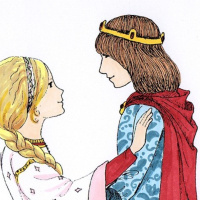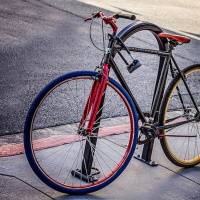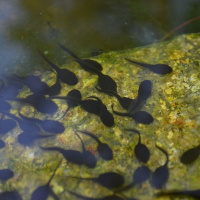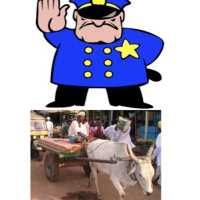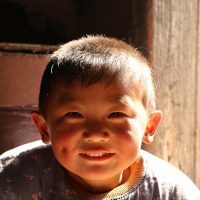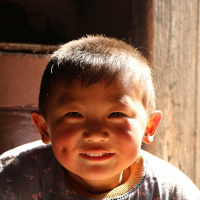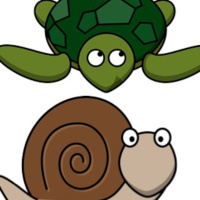Sinopsis
Using more than 99% target language, Learning Chinese through Stories(LCTS) creates authentic and immersive podcasts to help people around the world develop Chinese language skills and cultural competency. It covers a wide range of topics and proficiency levels. Every story has two parts: story (A) and story explanation (B), accompanied by annotated vocabulary and transcript.http://www.learningchinesethroughstories.com/
Episodios
-
1.2.21 诗歌《四季》
19/10/2016 Duración: 01minThis is a short poem about four season. In the poem, each season is represented by a plant, animal or a symbol. Those plants, animals and symbols will introduce what season it is. 四季 sìjì Noun phrase, four seasons 草 cǎo Noun, grass 芽 yá Noun, bud 尖 jiān Adj, pointed; sharp at the tip 小鸟 xiǎo niǎo Noun, little bird(s) 春天 chūntiān Noun, spring 荷叶 hé yè Noun, lotus leaf 圆 yuán Adj, round 青蛙 qīngwā Noun, frog 夏天 xiàtiān Noun, summer 谷穗 gǔ suì • Noun, beard of a cereal spike 弯 wān Adj, curved; bent Verb, to bend 鞠躬 jūgōng Verb, to bow 秋天 qiūtiān Noun, autumn 雪人 xuěrén Noun, snowman 肚子 dùzi Noun, belly 挺 tǐng Verb, to protrude 顽皮 wánpí Adj, naughty 冬天 dōngtiān Noun, winter 诗歌《四季》 草芽尖尖,他对小鸟说:“我是春天。” 荷叶圆圆,他对青蛙说:“我是夏天。” 谷穗弯弯,他鞠着躬说:“我是秋天。” 雪人大肚子一挺,他顽皮地说:“我就是冬天。”
-
2.1.18 笑话《餐巾纸》
17/10/2016 Duración: 10minSo a lot of public restrooms in China do not provide toilet paper. Have it ever happened to you that you just had a number 2 but could not find any toilet paper? Check out how this witted Chinese guy handled the emergency... Worksheet questions for this story can be found under the tab "练习题Worksheet" on http://www.learningchinesethroughstories.com 今天上厕所忘带纸了,好在我够机智,打电话说:喂,给我来份外卖啊!外卖小哥说:“好的,请问先生您的地址在哪?”我说:“就在你家店的东边的公厕右手边的第三个坑,记得多带点餐巾纸啊... ——摘自http://www.mahua.com/tags/jingdianxiaohua/ 餐巾纸 cānjīnzhǐ Noun, napkins 白纸,paper 卫生纸,toilet paper 好在 hǎo zài Adv, fortunately 够 gòu “够+adj” means “…enough” 够聪明,smart enough 够了!“Enough!” 机智 jīzhì Adj, witted 份 fèn Measure word for “food delivery” 外卖 wàimài Noun, food delivery 小哥 xiǎo gē Noun, young male who works as delivery guy 地址 dìzhǐ Noun, address 公厕 gōngcè Noun, public restroom Short for 公共厕所 坑 kēng Noun, toilet stall; hole
-
1.3.18B 故事解读《小猫钓鱼》
17/10/2016 Duración: 11minWorksheet questions for this story can be found under the tab "练习题Worksheet" on http://www.learningchinesethroughstories.com 带 dài Verb, to take (along with oneself) 河边 hé biān Noun phrase, river bank; river side 蜻蜓 qīngtíng Noun, dragonfly 捉 zhuō Verb, to catch (animals) 空手 kōngshǒu empty hands; with hands empty 蝴蝶 húdié Noun, butterfly 气人 qì rén (this) makes me mad; a complaint to say when one is getting pissed Or 气死人了!气死我了! 着 zháo Resultative particle word, verb +着 means one is able to complete the action with success 一会儿 yí huì 'er Noun phrase, a short period of time; (do something) for a little bit of time When 一会儿 is used consecutively, it usually means one cannot focus on one task. Instead, he/she keeps getting distracted by doing something else. 三心二意 sānxīn'èryì Chengyu, three hearts and two minds. It means someone is of two minds and cannot focus on one task. 一心一意,wholeheartedly.
-
1.3.18A 故事《小猫钓鱼》
17/10/2016 Duración: 03minThis fable story is about whether one should multitask or not. Kitty went fishing with her mom and she failed to get any fish, even the small ones. Her mom concluded that it was because she could not focus on one task at one time. Worksheet questions for this story can be found under the tab "练习题Worksheet" on http://www.learningchinesethroughstories.com 猫妈妈带着小猫在河边钓鱼。 一只蜻蜓飞来了,小猫看见了,就去捉蜻蜓。蜻蜓飞走了,小猫空着手回到河边,看见妈妈钓着了一条大鱼。 一只蝴蝶飞来了,小猫看见了,又去捉蝴蝶。蝴蝶飞走了,小猫还是空着手回到河边, 看见妈妈又钓着了一条大鱼。 小猫说:“真气人!我怎么一条小鱼也钓不着。” 猫妈妈看了看小猫说:“钓鱼就钓鱼,不要一会儿捉蜻蜓,一会儿捉蝴蝶。三心二意,怎么能钓到鱼呢?” ——摘自人教版语文课本
-
2.2.14B 故事解读《惊弓之鸟》
14/10/2016 Duración: 27minWorksheet questions for this story can be found under the tab "练习题Worksheet" on http://www.learningchinesethroughstories.com 古时候 gǔ shíhòu Noun phrase, ancient times 有名 yǒumíng Adj, well-known 射箭 shèjiàn Verb, to shoot an arrow; noun, archery 能手 néngshǒu Noun, a person who is skilled at something 郊外 jiāowài Noun, suburb 打猎 dǎliè Verb, to hunt; noun, hunting 猎人,hunter 大雁 dàyàn Noun, wild goose 远处 yuǎn chù Noun, a faraway place 近处,a nearby place 鸣 míng Verb, (birds) make noise 指 zhǐ Verb, to point 弓 gōng Noun, bow 掉 diào Verb, to fall 本事 běnshì Noun, skill; ability; capability 很有本事 means someone has a lot of connections and can always make things happen. 取 qǔ Verb, to fetch 取钱,withdrawl money 弦 xián Noun, string 响 xiǎng Noun, sound; verb, to ring 拍 Pāi Verb, to flap (wings) 翅膀 chìbǎng Noun, wing(s) 忽然 hūrán Adv, suddenly 半空 bànkōng Noun, mid air 大吃一惊 dàchīyìjīng Verb, to be astonished 吃了一惊;很吃惊 受伤 shòushāng Verb, to get injured 更加 gèngjiā Adv, even more (+adjective) 奇怪 qíguài Adj, strange; weird 悲惨 bēicǎn Adj,
-
2.2.14A 故事《惊弓之鸟》
14/10/2016 Duración: 04minWhile hunting at suburb, Genglei, a well-known archer from Wei told the king that he could get a flying wild goose without using an arrow. The king did not believe it until he saw what really happened... Worksheet questions for this story can be found under the tab "练习题Worksheet" on http://www.learningchinesethroughstories.com 更羸(léi)是古时候魏(wei4)国有名的射箭能手。 有一天,更羸跟魏王到郊外去打猎。一只大雁从远处慢慢地飞过来,边飞边鸣。更羸指着大雁对魏王说:“大王,我不用箭,只要拉一下弓,这只大雁就能掉下来。” “是吗?”魏王信不过自己的耳朵,问道,“你有这样的本事?” 更羸说:“请让我试一下。” 更羸并不取箭,他左手拿弓,右手拉弦(xian2),只听得嘣(beng1)的一声响,那只大雁直往上飞,拍了两下翅膀,忽然从半空里直掉下来。 “啊!”魏王看了,大吃一惊,说:“真有这样的本事!” 更羸笑笑说:“不是我的本事大,是因为我知道,这是一只受过箭伤的鸟。” 魏王更加奇怪了,问:“你怎么知道的?” 更羸说:“它飞得慢,叫的声音很悲(bei1)惨(can3)。飞得慢,因为它受过箭伤,伤口没有愈(yu4)合,还在作痛;叫得悲惨,因为它离开同伴,孤单失群,得不到帮助。它一听到弦响,心里很害怕,就拼命往高处飞。它一使劲,伤口又裂开了,就掉了下来。” ——摘自人教版语文课本三年级下册
-
2.3.7B 故事解读《掌声》
11/10/2016 Duración: 32min文静 wénjìng Adj, quiet (describe girls only) 默默 mòmò Adv, silently 一角 yìjiǎo Noun, one corner 角落, corner 早早 zǎozǎo Adv, early We don’t say晚晚 for late. 小儿麻痹症xiǎo'ér mábì zhèng Polio 患有小儿麻痹症or 得了小儿麻痹症 落下 làoxià Verb, a problem was caused by a disease and it never goes away 腿脚落下了残疾 (her) legs and feet were left handicapped because of the disease 残疾 cánjí Adj, handicapped 残疾人,handicapped people 愿意 yuànyì Verb, to be willing to do… 姿势 zīshì Noun, posture 轮流 lúnliú Verb, to take turns 讲台 jiǎngtái Noun, teacher’s stage 舞台,stage 轮到 lún dào Verb phrase, (the turn) goes to …; it is someone’s turn 轮到你了! It is your turn! 目光 mùguāng Noun, sight 一齐 yìqí Adv, altogether 投向 tóuxiàng Verb phrase, (eyes) look towards 立刻 Lìkè Adv, immediately Or 马上 调 diào Verb, assign (someone to work at…) 把王老师调到这个学校来。Assign Wanglaoshi to this school. 情况 qíngkuàng Noun, situation 犹豫 yóuyù Adj, hesitant 慢吞吞 màn tūn tūn Verb, slowly 吞吞吐吐,to mutter and mumblr 眼圈 yǎnquān Noun, circles of eyes 注视 zhùshì Verb, to watch with respect 一摇一晃 yìyáo yíhuàng
-
2.3.7A 故事《掌声》
11/10/2016 Duración: 05minAs a handicapped girl who suffered polio when she was little, Yingzi always came to school very early and left at last because she felt embarrassed to walk in front of others. One day, Yingzi was called up by a new teacher to present a story in front of the whole class. Yingzi did not know that her life was going to changed... 上小学的时候,我们班有位叫英子的同学。她很文静,总是默默地坐在教室的一角。上课前,她早早地就来到教室,下课后,她又总是最后一个离开。因为她得过小儿麻痹症,腿脚落下了残疾,不愿意让别人看见她走路的姿势。 一天,老师让同学们轮流上讲台讲故事。轮到英子的时候,全班同学的目光一齐投向了那个角落,英子立刻把头低了下去。老师是刚调来的,还不知道英子的情况。 英子犹豫了一会儿,慢吞吞地站了起来,眼圈红红的。在全班同学的注视下,她终于一摇一晃地走上了讲台。就在英子刚刚站定的那一刻,教室里骤然间响起了掌声,那掌声热烈而持久。 在掌声里,我们看到,英子的泪水流了下来。掌声渐渐平息,英子也镇定了情绪,开始讲述自己的一个小故事。她的普通话说得很好,声音也十分动听。故事讲完了,教室里又响起了热烈的掌声。英子向大家深深地鞠了一躬,然后,在掌声里一摇一晃地走下了讲台。 从那以后,英子就像变了一个人似的,不再像以前那么忧郁。她和同学们一起游戏说笑,甚至在一次联欢会上,还让同学们教她跳舞。 几年以后,我们上了不同的中学。英子来信说:“我永远不会忘记那掌声,因为它使我明白,同学们并没有歧视我。大家的掌声给了我极大的鼓励,使我鼓起勇气微笑着面对生活。” ——摘自人教版小学语文课本三年级上册
-
2.l.17 笑话《王子和公主》
11/10/2016 Duración: 08minThe prince was under a curse and he could only say one word every one year. Hence, he did not speak for 5 years so that he could tell a princess something very important. Five years passed and when he finally could say five words, something shocking happened... Worksheet questions for this story can be found under the tab "练习题Worksheet" on http://www.learningchinesethroughstories.com 王子被施了魔法,一年只能说一个字。他五年没说话,攒够能讲五个字时,来到公主面前说:“公主我爱你”。公主只回答了一个字,王子就晕倒了。公主说“啥?” ——摘自http://www.jj59.com/gaoxiaowenzhang/030757.html 王子 wángzǐ Noun, prince 施 shī Verb, to cast (a spell over someone or something) 魔法 mófǎ Noun, wizardry 攒 zǎn Verb, to accumulate 够 gòu Adj, enough; sufficient 讲 jiǎng Verb, to speak; to talk 公主 gōngzhǔ Noun, princess 晕 yūn Verb, to faint 倒 dǎo Verb, to fall down 啥 shá Pronoun, what? Usually used by itself as“啥?”to ask another interlocutor for repeat 干啥呢? A colloquial way to ask “What are you up to?” in Northeastern China.
-
2.1.16 笑话《老人丢车》
06/10/2016 Duración: 12minFind the transcript of glossary under "Stories", "Joke stories" on http://www.learningchinesethroughstories.com An old man decided to put three locks on his newly-bought bicycle after losing his previous one. And he also left a note to any potential thief. On the following day, his bicycle was kept well; however, he also saw something unbelievable... 一老人丢车,当他将新买的自行车放在楼下时,他上了三把锁并夹了张纸:“让你丫偷!”第二天,车没有丢,并多了两把锁和一张纸:“让你丫骑!” 丢 diū Verb, to lose 将 jiāng Pretransitive, same with “把” 自行车 zìxíngchē Noun, bicycle 楼下 lóu xià Noun phrase, downstairs 上锁 shàng suǒ Verb phrase, to lock the lock 把 bǎ Measure word for “lock” 并 bìng Conjunction word, (not only…,) but also… 夹 jiá Verb, to place in between (我)让你…… (wǒ) ràng nǐ…… (I) won’t let you do… as you want. 丫 yā Curse word in Beijing dialect, usually follows “你”,to express one’s anger about “you”, the other interlocutor. Exchangeable with “他妈的”in mandarin. 偷 tōu Verb, to steal 骑 qí Verb, to ride (horse, bicycle)
-
2.1.15 笑话《家里闹鬼》
05/10/2016 Duración: 09minA drunken man found his house was haunted. But when he told his wife the terrifying story, his wife slapped him. Listen to this episode and find out why. Find the transcript of glossary under "Stories", "Joke stories" on http://www.learningchinesethroughstories.com 醉汉回到家,对妻子说:“家里闹鬼了!”妻子满脸惊恐,问:“何以见得?”醉汉说:“我一拉卫生间的门,灯就亮了,而且阴风阵阵,寒气逼人!”妻字一巴掌打去:“你他妈的又尿冰箱里了。” 醉汉 zuì hàn Noun, drunken man 妻子 qīzǐ Noun, wife 闹鬼 nàoguǐ Verb phrase, to be haunted (by ghost) 这间房子闹鬼! This room is haunted! 满脸 mǎn liǎn Noun phrase, the whole face 惊恐 jīngkǒng Adj, alarmed and panicky 何以见得 héyǐ jiàndé Chengyu, “How do you know?” 阴风阵阵 yīnfēng zhèn zhèn Chengyu, chilly wind blows 阵, measure word for 风 寒气逼人 hánqì bī rén Chengyu, there is a nip in the air 巴掌 bāzhang Noun, palm; hand 打/给……一巴掌,Slap someone on the face 他妈的 tā mā de Curse word, express ones’ anger Subject+ 他妈的+ verb+object. “他妈的!”means “Damn it!”by itself. 尿 niào Verb, to pee; noun, urine 冰箱 bīngxiāng Noun, refrigerator
-
2.1.14B 故事解读《小蝌蚪找妈妈》
04/10/2016 Duración: 26minNew words and grammatical structures in the story are being taught in this episode. A lot of repetitions are used so that our learners can get master this story in no time! Enjoy the lesson and please find the new word list on our website: www.learningchinesethroughstories.com 蝌蚪 kēdǒu Noun, tadpole 池塘 chítáng Noun, pond 游泳池,swimming pool 脑袋 nǎodai Noun, brain 甩 shuǎi Verb, to whip 歌曲《一个人的精彩》 快活 kuàihuó Adj, happy 啊(哇) a (wa) Verb+啊+verb, doing something without a stop 吃啊吃,eat and eat 走哇走,walk and walk 鲤鱼 lǐyú Noun, carp 捕食 bǔshí Verb phrase, (predators) hunt for food 迎 yíng Verb, to go to meet; to welcome 宽 kuān Adj, wide 乌龟 wūguī Noun, turtle 摆动 bǎidòng Verb, to sway; to swing 连忙 liánmáng Adv, promptly; immediately; instantly Or 赶忙,赶紧 追 zhuī Verb, to chase 顶上 dǐng shàng Pronoun, the top (side) 披 pī Verb, to drape over (ones’ shoulder) 衣裳 yīshang Noun, clothes 荷花 héhuā Noun, lotus flower 荷叶 hé yè Noun, lotus leaf 蹲 dūn Verb, to squat 青蛙 qīngwā Noun, frog 碧绿 bì lì Adj, green as a jade 露 lòu Verb, to expose 雪
-
2.1.14A 故事《小蝌蚪找妈妈》
04/10/2016 Duración: 03minThis is the story that all Chinese people grew up with. It aimed to teach kids the scientific knowledge about tadpoles' life cycles into frogs. The story was also adapted into a watercolor animation and it gained a great success. Find the transcript of glossary under "Stories", "Scientific stories" on http://www.learningchinesethroughstories.com 池塘里有一群小蝌蚪,大大的脑袋,黑灰色的身子,甩着长长的尾巴,快活地游来游去。 小蝌蚪游哇游,过了几天,长出两条后腿。他们看见鲤鱼妈妈在教小鲤鱼捕食,就迎上去,问:“鲤鱼阿姨,我们的妈妈在哪里?”鲤鱼妈妈说:“你们的妈妈四条腿,宽嘴巴。你们到那边去找吧!” 小蝌蚪游哇游,过了几天,长出两条前腿。他们看见一只乌龟摆动着四条腿在水里游,连忙追上去,叫着:“妈妈,妈妈!”乌龟笑着说:“我不是你们的妈妈。你们的妈妈头顶上有两只大眼睛,披着绿衣裳。你们到那边去找吧!” 小蝌蚪游哇游,过了几天,尾巴变短了。他们游到荷花旁边,看见荷叶上蹲着一只大青蛙,披着碧绿的衣裳,露着雪白的肚皮,鼓着一对大眼睛。 小蝌蚪游过去,叫着:“妈妈,妈妈!”青蛙妈妈低头一看,笑着说:“好孩子,你们已经长成青蛙了,快跳上来吧!”他们后腿一蹬,向前一跳,蹦到了荷叶上。 不知什么时候,小青蛙的尾巴已经不见了。他们跟着妈妈,天天去捉害虫。 ——摘自人教版小学语文课本一年级下册
-
2.2.13 笑话《农民和警察》
04/10/2016 Duración: 09minA farmer was driving his bullock cart to the city, while a cop stopped him for driving a cart without a car plate. The farmer got really angry. He did one thing that made the cop so mad that he fainted and fell... Find the transcript of glossary under "Stories", "Joke stories" on http://www.learningchinesethroughstories.com 一农民赶牛车进城被警察拦下,理由是没有车牌。农民愤怒,找来一木板写了一牌挂上,警察当场晕倒,只见牌上写着:牛B—74110。 农民 nóngmín Noun, farmer 赶 gǎn Verb, to drive (a bullock cart, a coach) 牛车 niú chē Noun, bullock cart 警察 jǐngchá Noun, policeman 拦下 lán xià Verb, to stop (someone from going somewhere/doing something) 理由 lǐyóu Noun, reason 车牌 chēpái Noun, car plate or牌照(zhào) 愤怒 fènnù Adj, angry 木板 mùbǎn Noun, a board made of wood 白板, whiteboard 挂上 guà shàng Verb, to hang 当场 dāngchǎng on the spot; immediately 晕倒 yūn dǎo Verb phrase, to faint and fall 牛B niú bī, Adj, (colloquial, improper for kids) cool; stunning Or 牛掰(bāi), a more appropriate way of say 牛B
-
3.3.1B 解读《乡村孩子与奥运会》
29/09/2016 Duración: 45minWe went through this commentary article with you with a focus on new words, sayings and cultural references. Transcript of this article can be found with the searching bar on the top left corner of our website www.learningchinesethroughstories.com
-
3.3.1A《乡村孩子与奥运会》
29/09/2016 Duración: 07minThis is a commentary article that targets on advanced-high learners. While China gets on the top-3 gold medal list of the Olympic Games, many kids from countryside barely get any physical education in school. Check out this article by Mr. Changjun Wang from a famous Chinese periodical "Sanlian Shenghuo Zhoukan". 乡村孩⼦与奥运会 马长军 奥运会开幕后,我在微信群里做了⼀个小调查,问家长们,孩⼦喜欢看哪项比赛,⼤多数家长都说孩⼦根本就不看体育节目,只有四五个家长提到孩⼦看了奥运会节目,但兴致不是很⾼,“看不懂”。有些家长还提到自⼰也不看体育节目。 要说这样的结果我不该感到意外。多年来⼀直教小学语⽂课,我曾经让学⽣写过“我最喜欢的体育活动”之类的作⽂,可孩⼦们写得真是“惨不忍睹”,不少学⽣从头到尾都没说清自⼰“最喜欢”的体育项目的具体名称,竟然就以“体育活动”之类词语表示,有的学⽣显然是⽆从下笔,想起什么写什么,写“赛跑”的最多,就是因为他们的体育课除了“赛跑”也就没别的了,更有说喜欢体育课是因为最自由,可以随便玩⼀节课的。有个别学⽣虽然也写了具体的体育项目,但不懂得相关项目活动规则,天马⾏空,简直要写成“少林⾜球”。 别说奥运会,体育其实离这些乡村孩⼦也很遥远。我去过⼀些乡村学校,也经常跟乡村同⾏聊天,了解到的情况实在令⼈失望。各班的课程表上每周顶多只有两三节体育课,有些学校的⾼年级每周有⼀节体育课就不错了,临到考试前,体育课全都变成练习课、作业课、模拟考试课。平时可怜的⼏节体育课如果没有被哪个老师随便“借用”,也常常因为没有专业的体育老师⽽“放⽺”。有的学校有个操场却没有什么体育设施也没有活动器材,就是⼀块平地⽽已,有的学校倒是有篮球架,但是很“幸运”,它从来没被篮球砸过。近些年财政拨款给很多乡村小学发放了⼀些体育器材,比如有乒乓球台,有的进了学校就直接被塞到器材室再也不见天日了。⾄于单杠、双杠、鞍马什么的,⼤概有的孩⼦听都没听说过呢。 体育、奥运会、⾜球等等这⼀切,对乡村孩⼦⽽⾔陌⽣到可能就不知道它们
-
1.3.16 笑话《乌龟和蜗牛》
27/09/2016 Duración: 08minTurtle got injured and his friend snail went to get him some medications. After a long wait for 2 hours, the turtle started to lose his patience and make complaint. And surprisingly, he found... 乌龟 受伤了,让蜗牛去买药。过了两个小时,蜗牛还没有回来。乌龟急了就骂它:“哼,这蜗牛,再不回来我可就死了!” 这时候 门外 传来了蜗牛的声音:“你再说我,我就不去帮你买药了!” 乌龟 wūguī Noun, turtle 受伤 shòushāng Verb, to get injured 药 yào Noun, medication 蜗牛 wōniú Noun, snail 急 jí Verb, to feel anxious 骂 mà Verb, to call names; to curse 时候 shíhou Noun, moment 这时候,at this moment 那时候,at that moment 什么时候?When? 门外 mén wài Noun phrase, the outside (of the room, house) 传 chuán Verb, (voice/sound/noise/news) comes/goes to somewhere; verb, to pass (a ball) 外面传来火车的声音。The noise of the train came from the outside. 把球传过来!Pass the ball here! 声音 shēngyīn Noun, voice;sound 声音大, loud 声音小,the sound is small
-
1.2.20 笑话《妈妈和儿子》
27/09/2016 Duración: 06minIt is time to go to bed and mom asked her son to go to check the light in the kitchen. The son came back to mom, bringing back a hilarious response. 妈妈:“儿子,你到厨房里去看一下,看看电灯有没有关?”儿子去了一下回来说:“妈妈,那里黑咕隆咚的,什么也看不见。我怎么知道?” 儿子 érzi Noun, son 厨房 chúfáng Noun, kitchen 电灯 diàndēng Noun, lighting bulb 关 guān Verb, to turn off; to switch off; to close 黑咕隆咚 hēigūlōngdōng Adj, extremely dark
-
1.3.15 笑话《爸爸和儿子》
26/09/2016 Duración: 03minThis is the first episode of our joke telling series. We want to thank our listeners for this great idea! Click on "like" or "I want more!" if you want more Chinese jokes like this. 爸爸问儿子:你将来 娶谁做老婆?儿子说:我要娶奶奶,她疼我!爸爸说:胡说,你怎么可以娶我妈呢?儿子说:你可以娶我妈做老婆,为什么我就不能娶你妈呢! ——摘自http://m.jj59.com/gaoxiaowenzhang/030757.html 将来 jiānglái Noun, future 娶 qǔ Verb, (a male) marry (his partner) 老婆 lǎopó Noun, wife 疼 téng Verb, to care a lot about someone 胡说 húshuō Non-sense
-
2.2.12B 故事解读《黄山奇石》
21/09/2016 Duración: 25min闻名中外 wénmíng zhōngwài Adj, world-famous; well-known to both locals and foreigners 风景区 fēngjǐng qū Noun, scenic area Or 景区 安徽 Ānhuī Anhui province, capital city is Hefei 景色 jǐngsè Noun, scene; view; landscape Or 风景 秀丽 xiùlì Adj, beautiful(only used to describe mountain, forest and natural scenes that have trees) 风景秀丽,景色秀丽 神奇 shénqí Adj, magical 尤其是 yóuqí shì Conjunction word, especially… 有趣 yǒuqù Adj, interesting Or 有意思,好玩 落 luò Verb, to land (on…) 落在… 飞机落在国际机场。The plane landed on the international airport. 山顶 shāndǐng Noun, top of the mountain 山脚,the foot of the mountain 石盘 shí pán Noun, a flat piece of stone that looks like a plate 陡峭 dǒuqiào Adj, steep 一动不动 yí dòngbùdòng Adj, still; like a statue. Verb, to be still. 蹲 dūn Verb, to squat 山头 shāntóu Noun, the top of the mountain (colloquial form) 望 wàng Verb, to look far into the distance 翻滚 fāngǔn Verb, to flip and roll 云海 yúnhǎi Noun, sea of clouds 手臂 shǒubì Noun, hand(s) and arm(s) 巨石 jùshí Noun, giant stone; boulder 巨人, giant man 金光闪闪 jīnguāng shǎnshǎn A









